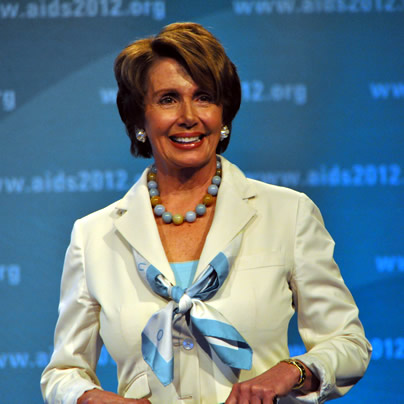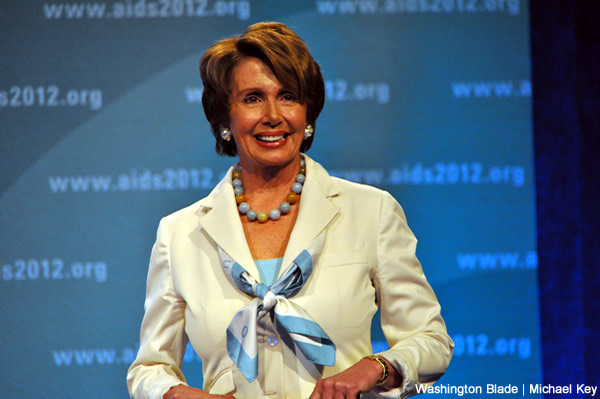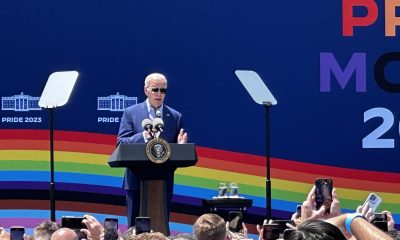Politics
Pelosi talks ENDA at Netroots Nation
Says discharge petition an option, but not enough votes to pass bill


House Minority Leader Nancy Pelosi (D-Calif.) talked ENDA at Netroots Nation. (Blade photo by Michael Key)
House Minority Leader Nancy Pelosi (D-Calif.) entertained on Saturday the idea of a discharge petition for the Employment Non-Discrimination Act — but was skeptical the bill has the votes for passage in the U.S. House.
Pelosi made the remarks in San Jose, Calif., during Netroots Nation, an annual conference for progressive bloggers and activists, when questioned about an ENDA discharge petition by panel moderator and political analyst Zerlina Maxwell.
“We can do discharge, but we don’t have enough votes to pass it,” Pelosi said. “So that means we have to have mobilization outside from some of our Republican friends, who should think that this is a form discrimination that we should be getting rid of. But this is certainly the next order of business for us.”
Initially, Pelosi in her lengthy response talked about the LGBT accomplishments between 2009 and 2010 when Democrats were in control of Congress and the White House, such as passage of hate crimes protections legislation and “Don’t Ask, Don’t Tell” repeal.
Pelosi said the initial plan was to proceed with ENDA, but the order was changed to repeal “Don’t Ask, Don’t Tell” first before the 111th Congress expired because that was what the “community” wanted.
“The community came to us and they said, ‘We feel more enthusiasm for your doing the repeal of ‘Don’t Ask, Don’t Tell’ first — well, second, because we had done hate crimes, now ENDA would be next,” Pelosi said. “They said, no, we wanted ‘Don’t Ask, Don’t Tell.’ And that, because we have to depend on outside mobilization and all the rest, and, of course, all four — that would be hate crimes, that would be ENDA, that would ‘Don’t Ask, Don’t Tell,’ that would be marriage equality — would be the four. We were trying to do them in the order of how we thought we could get them done fastest. We thought ENDA; they thought ‘Don’t Ask, Don’t Tell’ repeal.”
Pelosi expressed enthusiasm for ENDA, saying it should be “the next order of business for us” and “we’ll do everything we possibly can” to pass the legislation.
However, Pelosi also said “bathrooms” has been an issue for the legislation, although she said that issue could have an easy fix.
“What it comes down to in some of the debate is bathrooms,” Pelosi said. “I’m just telling you honestly what some of the debate is about on that subject because if you have everybody there and ENDA is the law, and you are not discriminating, then who uses what John? Just put a unisex sign on the John and get this thing over with, right? What’s the problem?”
Tico Almeida, president of Freedom to Work, expressed displeasure with Pelosi’s response, but said it’s a good sign that she didn’t rule out the possibility of a discharge petition.
“Unfortunately, Leader Pelosi launched a long and winding filibuster and avoided making any concrete commitment to lead on our community’s proposed ENDA discharge petition in 2013,” Almeida said. “But she did not rule out this bold strategy either, and we are hopeful she will agree eventually.”
A successful discharge petition would bring ENDA to the House floor regardless of whether Republican leaders like House Speaker John Boehner (R-Ohio) or House Majority Leader Eric Cantor (R-Va.) want to keep it from a vote. For a discharge petition to succeed, a majority of House members, or 218, have to sign it.
That’s 42 more names than the current 176 lawmakers who currently sponsor in the House. The last time a discharge petition succeeded was 11 years ago in 2002 for campaign finance reform legislation known as McCain–Feingold in the Senate.
Nonetheless, Almeida was optimistic that a discharge petition would be a strategy that would yield positive results if pursued.
“Just a few months ago, House Democrats launched a discharge petition for the Paycheck Fairness Act, and that’s already gotten around 200 signatures,” Almeida said. “We believe ENDA could get even more signatures on our proposed discharge petition, and we have a small shot at getting to 218. But in order to have a chance to win, the House Democrats have to first be willing to try.”
Freedom to Work promoted the idea of asking Pelosi about the ENDA discharge petition prior to the start of the panel by sending out the proposed question via Twitter using the hastag #AskPelosi. Among those who retweeted the proposal were PFLAG National, the TaskForce and Rick Jacobs of the Courage Campaign.
We'd #AskPelosi to lead a discharge petition to get the House to vote on #ENDA. #nn13 #nn13lgbt #LGBTworkers #morethanmarriage
— Freedom to Work (@FreedomtoWork) June 22, 2013
As reported by other media outlets, Pelosi was also booed during the same session when she defended the recently revealed data collection policies under the Obama administration at the National Security Agency . The heckler wasn’t concerned about ENDA, but what a called a “secret law.”
Almeida said he’ll continue to pursue a discharge petition because attention will be on the lower chamber of Congress to pass ENDA if the Senate approves the legislation.
“Once we pass ENDA in the Senate this fall, with 60 or more bipartisan votes, the pressure will grow even stronger for House Democrats to launch the discharge petition in 2013,” Almeida said. “We spoke with several House Democrats about this strategy this weekend in San Jose, and I think there will be interest.”
Almeida declined to identify which House Democrats with whom he had spoke and which expressed interest in a discharge petition, but said these lawmakers wanted him to follow up next week.
With the Supreme Court decisions on the Defense of Marriage Act and California’s Proposition 8 expected next week, Almeida emphasized that LGBT workplace protections and marriage equality are both priorities worth pursuing.
“We will continue this campaign to make 2013 the year for progress not only on the freedom to marry, but also the freedom to work,” Almeida said. “We deserve both freedoms. We deserve full equality under law.”
CORRECTION: An initial version of the article, citing a transcript from the Northwest Pacific Progressive Institute, misquoted and mischaracterized Pelosi’s remarks on ENDA. The Blade regrets the error.
Politics
After Biden signs TikTok ban its CEO vows federal court battle
“Rest assured, we aren’t going anywhere,” CEO said

President Joe Biden signed an appropriations bill into law on Wednesday that provides multi-billion dollar funding and military aid for Ukraine, Israel, and Taiwan after months of delay and Congressional infighting.
A separate bill Biden signed within the aid package contained a bipartisan provision that will ban the popular social media app TikTok from the United States if its Chinese parent company ByteDance does not sell off the American subsidiary.
Reacting, TikTok CEO Shou Zi Chew said Wednesday that the Culver City, Calif.-based company would go to court to try to remain online in the U.S.
In a video posted on the company’s social media accounts, Chew denounced the potential ban: “Make no mistake, this is a ban, a ban of TikTok and a ban on you and your voice,” Chew said. “Rest assured, we aren’t going anywhere. We are confident and we will keep fighting for your rights in the courts. The facts and the constitution are on our side, and we expect to prevail,” he added.
Our response to the TikTok Ban Bill in the US: https://t.co/LpoE67sxHo
— TikTokComms (@TikTokComms) April 24, 2024
White House Press Secretary Karine Jean-Pierre adamantly denied during a press briefing on Wednesday that the bill constitutes a ban, reiterating the administration’s hope that TikTok will be purchased by a third-party buyer and referencing media reports about the many firms that are interested.
Chew has repeatedly testified in both the House and Senate regarding ByteDance’s ability to mine personal data of its 170 million plus American subscribers, maintaining that user data is secure and not shared with either ByteDance nor agencies of the Chinese government. The testimony failed to assuage lawmakers’ doubts.
In an email, the former chair of the House Intelligence Committee, U.S. Rep. Adam Schiff (D-Calif.), who doesn’t support a blanket ban of the app, told the Washington Blade:
“As the former chairman of the House Intelligence Committee, I have long worked to safeguard Americans’ freedoms and security both at home and abroad. The Chinese Communist Party’s ability to exploit private user data and to manipulate public opinion through TikTok present serious national security concerns. For that reason, I believe that divestiture presents the best option to preserve access to the platform, while ameliorating these risks. I do not support a ban on TikTok while there are other less restrictive means available, and this legislation will give the administration the leverage and authority to require divestiture.”
A spokesperson for U.S. Sen. Alex Padilla (D-Calif.) told the Blade: “Senator Padilla believes we can support speech and creativity while also protecting data privacy and security. TikTok’s relationship to the Chinese Communist Party poses significant data privacy concerns. He will continue working with the Biden-Harris administration and his colleagues in Congress to safeguard Americans’ data privacy and foster continued innovation.”
The law, which gives ByteDance 270 days to divest TikTok’s U.S. assets, expires with a January 19, 2025 deadline for a sale. The date is one day before Biden’s term is set to expire, although he could extend the deadline by three months if he determines ByteDance is making progress or the transaction faces uncertainty in a federal court.
Former President Donald Trump’s executive order in 2020, which sought to ban TikTok and Chinese-owned WeChat, a unit of Beijing-based Tencent, in the U.S., was blocked by federal courts.
TikTok has previously fought efforts to ban its widely popular app by the state of Montana last year, in a case that saw a federal judge in Helena block that state ban, citing free-speech grounds.
The South China Morning Post reported this week that the four-year battle over TikTok is a significant front in a war over the internet and technology between Washington and Beijing. Last week, Apple said China had ordered it to remove Meta Platforms’s WhatsApp and Threads from its App Store in China over Chinese national security concerns.
A spokesperson for the ACLU told the Blade in a statement that “banning or requiring divestiture of TikTok would set an alarming global precedent for excessive government control over social media platforms.”
LGBTQ TikToker users are alarmed, fearing that a ban will represent the disruption of networks of support and activism. However, queer social media influencers who operate on multiple platforms expressed some doubts as to long term impact.
Los Angeles Blade contributor Chris Stanley told the Blade:
“It might affect us slightly, because TikTok is so easy to go viral on. Which obviously means more brand deals, etc. However they also suppress and shadow ban LGBTQ creators frequently. But we will definitely be focusing our energy more on other platforms with this uncertainty going forward. Lucky for us, we aren’t one trick ponies and have multiple other platforms built.”
Brooklyn, N.Y.,-based gay social media creator and influencer Artem Bezrukavenko told the Blade:
“For smart creators it won’t because they have multiple platforms. For people who put all their livelihood yes. Like people who do livestreams,” he said adding: “Personally I’m happy it gets banned or American company will own it so they will be less homophobic to us.”
TikTok’s LGBTQ following has generally positive experiences although there have been widely reported instances of users, notably transgender users, seemingly targeted by the platform’s algorithms and having their accounts banned or repeatedly suspended.
Of greater concern is the staggering rise in anti-LGBTQ violence and threats on the platform prompting LGBTQ advocacy group GLAAD, in its annual Social Media Safety Index, to give TikTok a failing score on LGBTQ safety.
Additional reporting by Christopher Kane
Politics
Smithsonian staff concerned about future of LGBTQ programming amid GOP scrutiny
Secretary Lonnie Bunch says ‘LGBTQ+ content is welcome’

Staff at the Smithsonian Institution are concerned about the future of LGBTQ programming as several events featuring a drag performer were cancelled or postponed following scrutiny by House Republicans, according to emails reviewed by the Washington Post.
In December, Secretary Lonnie G. Bunch III appeared before a hearing led by GOP members of the Committee on House Administration, who flagged concerns about the Smithsonian’s involvement in “the Left’s indoctrination of our children.”
Under questioning from U.S. Rep. Stephanie Bice (R-Okla.), Bunch said he was “surprised” to learn the Smithsonian had hosted six drag events over the past three years, telling the lawmakers “It’s not appropriate to expose children” to these performances.
Collaborations with drag artist Pattie Gonia in December, January, and March were subsequently postponed or cancelled, the Post reported on Saturday, adding that a Smithsonian spokesperson blamed “budgetary constraints and other resource issues” and the museums are still developing programming for Pride month in June.
“I, along with all senior leaders, take seriously the concerns expressed by staff and will continue to do so,” Bunch said in a statement to the paper. “As we have reiterated, LGBTQ+ content is welcome at the Smithsonian.”
The secretary sent an email on Friday expressing plans to meet with leaders of the Smithsonian Pride Alliance, one of the two groups that detailed their concerns to him following December’s hearing.
Bunch told the Pride Alliance in January that with his response to Bice’s question, his intention was to “immediately stress that the Smithsonian does not expose children to inappropriate content.”
“A hearing setting does not give you ample time to expand,” he said, adding that with more time he would have spoken “more broadly about the merits and goals of our programming and content development and how we equip parents to make choices about what content their children experience.”
Politics
Survey finds support for Biden among LGBTQ adults persists despite misgivings
Data for Progress previewed the results exclusively with the Blade

A new survey by Data for Progress found LGBTQ adults overwhelmingly favor President Joe Biden and Democrats over his 2024 rival former President Donald Trump and Republicans, but responses to other questions may signal potential headwinds for Biden’s reelection campaign.
The organization shared the findings of its poll, which included 873 respondents from across the country including an oversample of transgender adults, exclusively with the Washington Blade on Thursday.
Despite the clear margin of support for the president, with only 22 percent of respondents reporting that they have a very favorable or somewhat favorable opinion of Trump, answers were more mixed when it came to assessments of Biden’s performance over the past four years and his party’s record of protecting queer and trans Americans.
Forty-five percent of respondents said the Biden-Harris administration has performed better than they expected, while 47 percent said the administration’s record has been worse than they anticipated. A greater margin of trans adults in the survey — 52 vs. 37 percent — said their expectations were not met.
Seventy precent of all LGBTQ respondents and 81 percent of those who identify as trans said the Democratic Party should be doing more for queer and trans folks, while just 24 percent of all survey participants and 17 percent of trans participants agreed the party is already doing enough.
With respect to the issues respondents care about the most when deciding between the candidates on their ballots, LGBTQ issues were second only to the economy, eclipsing other considerations like abortion and threats to democracy.
These answers may reflect heightened fear and anxiety among LGBTQ adults as a consequence of the dramatic uptick over the past few years in rhetorical, legislative, and violent bias-motivated attacks against the community, especially targeting queer and trans folks.
The survey found that while LGBTQ adults are highly motivated to vote in November, there are signs of ennui. For example, enthusiasm was substantially lower among those aged 18 to 24 and 25 to 39 compared with adults 40 and older. And a plurality of younger LGBTQ respondents said they believe that neither of the country’s two major political parties care about them.
-

 State Department3 days ago
State Department3 days agoState Department releases annual human rights report
-

 Maryland4 days ago
Maryland4 days agoJoe Vogel campaign holds ‘Big Gay Canvass Kickoff’
-

 Politics3 days ago
Politics3 days agoSmithsonian staff concerned about future of LGBTQ programming amid GOP scrutiny
-

 The White House2 days ago
The White House2 days agoWhite House debuts action plan targeting pollutants in drinking water












